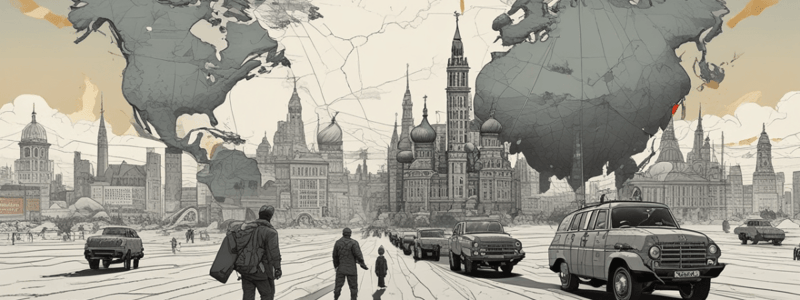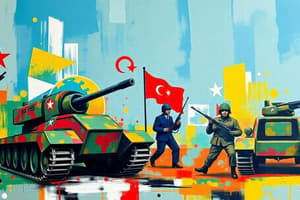Podcast
Questions and Answers
Both sides engaged in extensive ______ and used media and information to promote their ideologies and discredit their opponent.
Both sides engaged in extensive ______ and used media and information to promote their ideologies and discredit their opponent.
spying
The Berlin Blockade and Airlift occurred in ______.
The Berlin Blockade and Airlift occurred in ______.
1948-1949
The Cold War had a significant ______ on international relations, even today.
The Cold War had a significant ______ on international relations, even today.
influence
The superpowers competed for ______ in Latin America, Africa, and Asia.
The superpowers competed for ______ in Latin America, Africa, and Asia.
The Cold War illustrates the long-term effects of ______ decisions.
The Cold War illustrates the long-term effects of ______ decisions.
Teaching the Cold War cultivates an understanding of how complex international ______ can be.
Teaching the Cold War cultivates an understanding of how complex international ______ can be.
The Cold War was a period of geopolitical tension between the United States and its allies (collectively known as the ______) and the Soviet Union and its allies (collectively known as the Eastern Bloc)
The Cold War was a period of geopolitical tension between the United States and its allies (collectively known as the ______) and the Soviet Union and its allies (collectively known as the Eastern Bloc)
The struggle between ______ (led by the United States) and communism (led by the Soviet Union) was a key feature of the Cold War
The struggle between ______ (led by the United States) and communism (led by the Soviet Union) was a key feature of the Cold War
The competition for ______ superiority led to the development of large arsenals of nuclear weapons, heightening the risk of global nuclear war
The competition for ______ superiority led to the development of large arsenals of nuclear weapons, heightening the risk of global nuclear war
A competition between the superpowers to achieve significant milestones in ______ exploration was a key feature of the Cold War
A competition between the superpowers to achieve significant milestones in ______ exploration was a key feature of the Cold War
The Korean War, the Vietnam War, and the Afghan War were examples of ______ wars
The Korean War, the Vietnam War, and the Afghan War were examples of ______ wars
The Cold War was a period of geopolitical tension between the United States and its allies and the Soviet Union and its allies, beginning shortly after ______ War II
The Cold War was a period of geopolitical tension between the United States and its allies and the Soviet Union and its allies, beginning shortly after ______ War II
What is the main reason for understanding the timeline of the Cold War?
What is the main reason for understanding the timeline of the Cold War?
What was the primary ideological difference between the United States and the Soviet Union during the Cold War?
What was the primary ideological difference between the United States and the Soviet Union during the Cold War?
What was the purpose of the nuclear arms race during the Cold War?
What was the purpose of the nuclear arms race during the Cold War?
What type of conflicts were fought during the Cold War, in which the two superpowers supported opposite sides?
What type of conflicts were fought during the Cold War, in which the two superpowers supported opposite sides?
What was the main goal of the space race during the Cold War?
What was the main goal of the space race during the Cold War?
Why is the study of the Cold War important for understanding global politics today?
Why is the study of the Cold War important for understanding global politics today?
What was a key aspect of the Cold War in terms of ideology and information?
What was a key aspect of the Cold War in terms of ideology and information?
What major event in 1961 marked a significant escalation of the Cold War?
What major event in 1961 marked a significant escalation of the Cold War?
What was a key feature of the superpowers' competition in regions like Latin America, Africa, and Asia?
What was a key feature of the superpowers' competition in regions like Latin America, Africa, and Asia?
What is a significant ongoing legacy of the Cold War in terms of international relations?
What is a significant ongoing legacy of the Cold War in terms of international relations?
What is a key aspect of teaching the Cold War to students?
What is a key aspect of teaching the Cold War to students?
What is a key lesson that the Cold War offers for peace and conflict in the present day?
What is a key lesson that the Cold War offers for peace and conflict in the present day?
Flashcards are hidden until you start studying
Study Notes
Definition and Duration
- The Cold War was a period of geopolitical tension between the United States and its allies (the West) and the Soviet Union and its allies (the Eastern Bloc).
- The Cold War began shortly after World War II and lasted until the early 1990s.
Key Features and Themes
- Ideological Conflict: A struggle between capitalism (led by the United States) and communism (led by the Soviet Union).
- Nuclear Arms Race: A competition for nuclear superiority that led to the development of large arsenals of nuclear weapons, heightening the risk of global nuclear war.
- Space Race: A competition between the superpowers to achieve significant milestones in space exploration.
- Proxy Wars: Indirect conflicts where the two superpowers supported opposite sides, such as the Korean War, the Vietnam War, and the Afghan War.
- Espionage and Propaganda: Both sides engaged in extensive spying and used media and information to promote their ideologies and discredit their opponent.
Major Events and Turning Points
- Berlin Blockade and Airlift (1948-1949)
- Construction of the Berlin Wall (1961)
- Cuban Missile Crisis (1962)
- Détente (late 1960s to late 1970s)
- Fall of the Berlin Wall and subsequent dissolution of the Soviet Union (1989-1991)
Impact on Various Regions
- Influence in Latin America, Africa, and Asia: The superpowers competed for influence through military, economic, and diplomatic means.
- Global Conflict: The Cold War affected many different peoples and cultures, not just those in the US and USSR.
Legacy and Relevance Today
- Continued influence on international relations: Ongoing mistrust or cooperation between Russia and Western countries.
- Arms control agreements: Ongoing importance in nuclear disarmament.
- Economic and political transitions: In former communist countries.
Critical Thinking and Reflection
- Different Perspectives: How history is interpreted from different perspectives.
- Lessons for Peace and Conflict: The lessons that the Cold War might offer for peace and conflict in the present day.
Studying That Suits You
Use AI to generate personalized quizzes and flashcards to suit your learning preferences.




